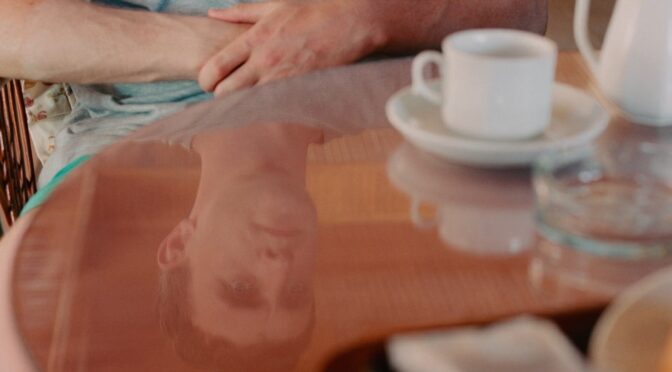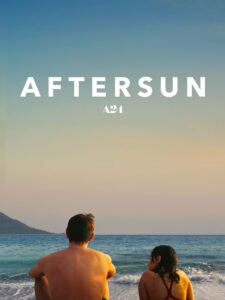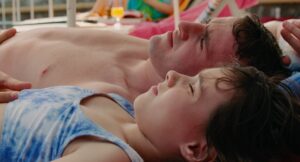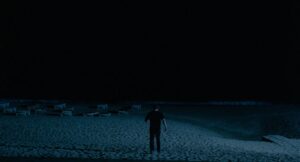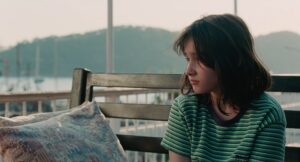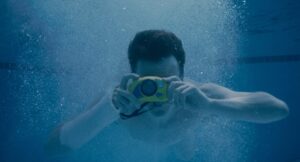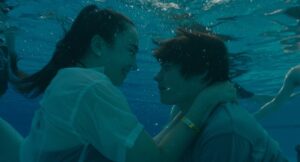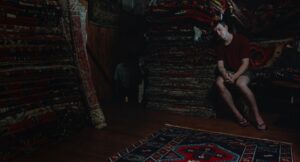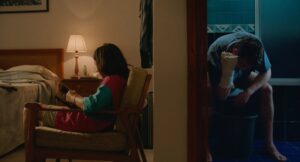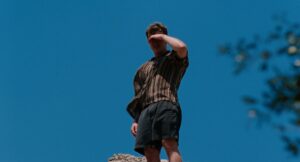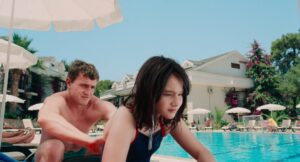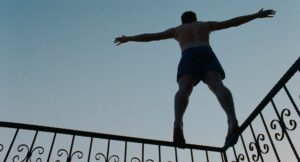2022 was a tremendous year for music in films. There were sharp new scores by the likes of Michael Abels, Terrence Blanchard and Alexandre Desplat. Richard Linklater’s Apollo 10 1/2 gave us its own curated American Bandstand of effervescent 60’s hits. Armageddon Time took us back to the golden dawn of late 80s hip hop. And the best film of the year was a high octane action musical from India with stunningly entertaining compositions. Even a tiny shell managed to warm up his voice and give us a couple easy-going ballads. The screen was populated by brilliant conductors and fiddle players and even a lovable old German school teacher who reached his students through the power of impromptu jam sessions. I was having trouble coming up with the year’s best needle drops, pre-existing songs that appear on a film’s soundtrack to give the film that extra bit of juice. Then it occurred to me that Charlotte Wells’ blisteringly poignant debut, Aftersun, really has 2022’s needle drop market cornered all on its own. The Scottish writer-director’s sublimely woozy memory play is set some time after the mid-1990s and it has a ball digging through that era’s most memorable singles. A group of guests at the film’s Turkish resort setting but out their best (read: most embarrassing) Macarenas. Teenagers take shots of beer to the chants of Chumbawumba’s “Tubthumping”. Even hacky UK girl group All Saints’ “Never Ever” (a song I have never ever ever ever cared for) does some effective scene setting. And Blur’s transcendent ballad “Tender” underscores one of the most nakedly sweet, generous father-daughter bonding scenes you’ll ever see. And yet, for as well-used and evocative as all those numbers are, I have a feeling the consensus best of Aftersun‘s needle drops is the song that doesn’t even belong to the film’s era. The best needle drop, and quite possibly best scene, of 2022 is the one Charlotte Wells saves for her sweetly shattering climax: Freddie Mercury and David Bowie’s wise and passionate 1980 duet, “Under Pressure”. That is a song that already means a lot to many people, one that’s had its place in pop history cemented long before any film thought to use it. And yet, it is a testament to the thrilling confidents of Wells’ exhilarating tone poem that Aftersun will be the first thing I think of whenever I hear that popular tune in the future. It’s just a bonafide stunner. It truly feels inconceivable that “Under Pressure” will ever be put to better use.
Aftersun is a subtle period piece, but I think you could make the argument the film isn’t strictly set at any time. It certainly concerns a very autobiographical vacation that a young Charlotte Wells took with her divorced father not too long before he passed away young. The characters in the film are 11-year old Scottish girl Sophie (newcomer Frankie Corio at first seems merely impressively naturalistic until you realize how tapped into film’s dreamy vision she is) and her single father Calum (a complex, heartbreaking tour de force by Irish rising star Paul Mescal). We meet them as they wearily ride a nighttime shuttle to their resort hotel. They are spending a week on the sunny coast of Turkey, to snorkel, to lounge by the pool, to enjoy the amenities and to spend what we sense is too-rare time together. Calum is a kind and gentle father, but there is a pertubed unrest behind his eyes. It is the late 1990s, we gather from the soundtrack, but time seems unreliable in this film. Maybe it’s just hazy in that same way Lost In Translation captured so vividly; the heady unreality of hotels and being in strange lands sleeping in beds that are not our own. Vacations are their own kind of liminal spaces. We do not live there and we do not go on them permanently. Another reason time seems slippery here is that Aftersun almost immediately lets us know that this is an older Sophie’s memories. The film is about experiencing the undulating recollection of a long ago trip and, I suppose, puzzling out why this grown woman is looking back on it with such poetic intensity. We come to see that Calum has demons that he can’t entirely keep from breaching his amiable surface. We know Sophie has been brought along so they can have quality time, maybe as an act of healing after her parents’ divorce. And we occasionally see a testy dynamic below the surface of what is an exceedingly fond and tender relationship. We also see a dream (its own liminal space) where the grown Sophie watches the darkened figure of her father at a rave club, lit only briefly by flickering strobe lights. Aftersun is partly an intimate, tonally spare film about a father and daughter on vacation. But it also announces itself as a kind of heady mystery. And the first little meta-mystery is figuring out what exactly the mystery is.
Part of the journey of Aftersun is Sophie’s first steps into adolescence. It is a film of small, subtle details, but they all seem to be holding a universe of meaning. I’ve now watched this gossamer fine film, tearfully but always happily, four times, and the meanings of its recurring images all add up to tell a full, albeit enigmatic story. As we follow Sophie’s gaze (both as a child and as an adult), we see her dawning awareness of a more adult world. Calum playfully encourages her to go make friends with some youths a couple years younger than her, but Sophie balks. “Dad. They’re, like, kids.” Calum likewise balks at the idea of meeting the kids’ older parents. “Sophie. They’re, like, adults.” Some of the mystery of Aftersun is about its young female protagonist just starting to piece together an idea of the world beyond that of childhood. It’s about her just dimly glimpsing the world of adults; young adults, in particular. In the hotel bathroom, she eavesdrops as two teenagers gossip about kissing and blowjobs. Sophie has not yet made the decisive first step into the adolescence she is about to have, but she is starting to pick up on that world. In some ways, she is still just a kid herself. Her father dotingly puts on her sunscreen every morning. Some older boys sheepishly apologize for swearing in front of her. She watches parasailers at the nearby beach glide through the sky past their chaise lounges, and she wants to know about them. They are parasailers, her father explains. But she is still not old enough to do that herself. The world of adults and teenagers is suddenly right in front of her, but much of it is not to be touched yet. Pre-adolescence is its own liminal space. When Sophie finally musters up the courage to hang out with the hormonal teenagers vacationing at the resort, she is suddenly even more aware of how much lust and sexual frankness has been drifting in front of her this whole time. She jumps into the same old swimming pool and sees the water is churning and full of fumbling hands and thrusting loins. Aftersun expertly captures a girl’s coming of age through visual language and through tonal shifts that reveal a child suddenly awakening to the world around her. She has just entered the dim room of the rest of her life and Charlotte Wells lets her eyes and ours slowly adjust to the piercing sunlight.
This is not only a film about seeing the world like a young adult, but about seeing people in a less childlike way. Aftersun is grown Sophie’s way of looking back on her father with an understanding of adult burdens (she and her girlfriend appear to have a newborn, heard faintly in the background during a brief cut to the present) and adult emotions. It may also be about the moment when the 11-year old Sophie begins to see her father in less flattering but exceedingly more human terms. The eyes of a child adjust to reality as they grow just, as Calum explains to his daughter, the way a camera lens gradually adapts to the light. With the benefit of time, we start to pick up things that were backlit or bathed in shadows before. That includes our parents Steven Spielberg’s The Fabelmans spoke to a child’s shift toward seeing their mother and father as fallible, frightened people, and Aftersun delves even further into that idea. It sees the terrifying expectations of being a parent who doesn’t have everything together. Calum is a lovely, thoughtful man and a devoted father, but something haunts him and pushes back at him. It’s probably depression but his condition stands in for any number of demons that might make it harder to raise a child. He’s an avatar of anyone plagued by something that keeps them from being entirely present. Paul Mescal’s incredible performance quietly shows us the mental illness Calum is trying to work through and the shame he feels over how that illness takes some piece of him away from his child. One day, the film all but tells us, it will take away more than just a piece. The love one feels for their child is such a powerful thing, but it does not and cannot negate forces as powerful a depression, bipolarity, alcoholism, and suicidal ideation. It’s a dismaying thought, but that overwhelming love keep one’s frailties out. That love must vie and coexist with those demons. There is not some parental switch that lets people set their neuroses aside until their child is asleep or away, much as we see Calum nobly try to will such a thing into being true. Not even your own baby’s smile can alter reality. Sophie finally sees the darkness that tormented her father. He didn’t win every battle against his own turmoil and he eventually lost the war. But Aftersun is not a dirge. It’s a daughter’s heartbreaking, thankful ode to her father for fighting to be present as much as he did. She sees now that he was gradually losing the fight and she loves him all the more for the fighting.
Roger Ebert famously said that a movie is not just what it’s about but how it’s about it. The themes of hidden struggles and recognizing the frailty and vulnerability of the people who raise us are wonderful, but they could have been wonderful in a much more modest package. In a spare indie drama with very few stylistic flourishes. At first (that is to say, early on), a spare indie drama is what Aftersun appears to be. What it actually is (and steadily becomes) is a lusciously tonal, boldly cinematic attempt to evoke memory itself. It taps into memory’s slipperiness and how our minds focus in on small details of times past. I still recall a shyly cheerful Swiss farmer woman from my very first vacation, a bashful smile framed by ruddy cheeks. Sophie remembers a sky full of parasailers and the first time she socialized with young adults. We remember things and we also forget things. And, with a more mature perspective, maybe we notice new details in the home videos of our minds. Aftersun is consistently smart in how it captures the fond haze of a cherished memory, but it only gets more formally bold and thrillingly emotional as we near the end of the footage. There is a naked sadness to how Wells sees memory. Every memory has at least some bit of melancholy because it is finite. We only have so much of it. We have these videos in our heads that let us hold onto parts of our past but those tapes end. And when they do, the only solace we have is that we can start them over and watch them again. And that bittersweet wisdom that swells through Aftersun is why it is the very opposite of some austere art piece. It is simply overwhelming and, in its oh so generous way, devastating. Aftersun has a hauntingly serene pace, but I cannot imagine finding it slow. It is simply too confident and empathetic and emotionally direct to be regarded as some challenging, opaque mood piece.
One of the big lessons 2022 (and later 2023) cinema taught is that audiences are underestimated. The financial success of recent bold works like Everything Everywhere All At Once and Oppenheimer are proof that the public is less averse to being challenged than the studios choose to believe. Aftersun didn’t make the kind of big money those two films did, but I thought about how easy it is to connect to as I watched it. I’ve been gratified to have a few friends see right through its gauzy aesthetic to find the open-hearted, cathartic powerhouse just below the surface. For all its quiet, meditative observance, this is not Memoria or The Souvenir or Certified Copy. If anything, it feels like the longing and yearning of Lost In Translation if it were even more emotionally direct. And what is being yearned for here is the touch (how masterfully this film lingers on skin and clasped hands) of someone you might never touch again. It’s the reason why the film absolutely blossoms on second viewing, once you know what is really happening; once you know that this isn’t just a chance to stage an elliptical tone poem in dazzling Turkish sunlight. The film might lull you into thinking its concerns are tonal and stylistic, that it’s simply the latest indie to see how much concentrated mood it can build up. What it’s actually doing though is disarming you. Like the Polaroid a waiter takes of Calum and Sophie on their last night together, Aftersun‘s true nature comes slowly into view, its contours growing ever sharper. And the film’s final scene, without betraying the film’s potent sense of style, makes everything you’ve been watching devastatingly clear. Aftersun‘s memory fog has been hiding an iceberg of heartache the whole time, and I defy anyone who has every loved and lost someone not to be rattled by it. 2022 threw out the imaginary, arbitrary list of what certain films are allowed to do and Aftersun is revolutionary in its own small way. If this is a spare indie film then welcome to an age where spare indie films can make tears flow like Titanic.
